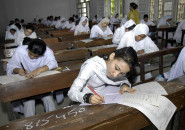Wrath of the heavens

Khyber-Pakhtunkhwa is not the only area to have drawn the wrath of the heavens. Rains have affected at least 150,000 people in seven districts of Balochistan including Sibi, Kohlu and Barkhan. The death toll continues to climb, with five more killed in the latest spell of rain. This adds to the 70 or so people who died several days ago as rains caused hill torrents to tumble down. In Gilgit-Baltistan, where floods have affected several thousand people and in parts of the Punjab where villages have been submerged, worse could lie ahead with rains likely to continue for some weeks. In the latter, some of the poorest districts in the south have seen the worst flooding in years.
The question to ask is whether the havoc caused can be blamed on natural factors alone. For weeks the Met Office has been warning that the monsoon this year will be heavier than usual. It is not too much to ask why preparatory steps were not taken in advance to prevent the worst mayhem and save lives of people taken largely unawares by the ferocity of the rains. Prior warnings to people could have enabled them to do more to save themselves. At the official level, rather than the desperate rescue work we see now, the setting up of camps in safe areas beforehand, the evacuation of people from the most vulnerable hillside (or river-side) villages and the stocking of vital relief supplies beforehand could have reduced human suffering and loss.
This of course did not happen. Inevitably the failure to do so will raise in the minds of people questions about the state’s commitment to them and its readiness to treat their needs as a priority. This is all the more true given how the flooding has hit a number of areas — including Malakand and Fata — already ravaged by conflict. The further loss of crops and livestock imperils people more. This is also true in Balochistan where some of the affected areas, notably Kohlu, have seen insurgency directed against security forces for years. Already, voices from there speak of dissatisfaction with rescue efforts and allegations of neglect. It is possible similar sentiments could surface in GB, where the continuing lake disaster has left behind feelings of disenchantment with authorities.
Such sentiments are inevitable in the face of calamity on this scale. Grief — as people look on at destroyed homes and lands or face human loss — often comes along with anger. But the degree to which this exists has been aggravated by the perception of a state unwilling to do enough. The governments in Khyber-Pakhthunkhwa and Balochistan must keep this in mind as they undertake relief work. The emphasis for now should be to provide shelter to those displaced and clean drinking water and food till such time that the floodwaters recede and those forced to flee can return to their homes. Particular care should be taken to prevent outbreak of disease since that is usually the next stage if displaced people are not taken care of promptly and provided clean housing and hygienic sanitation facilities.
Published in The Express Tribune, July 31st, 2010.



















COMMENTS
Comments are moderated and generally will be posted if they are on-topic and not abusive.
For more information, please see our Comments FAQ